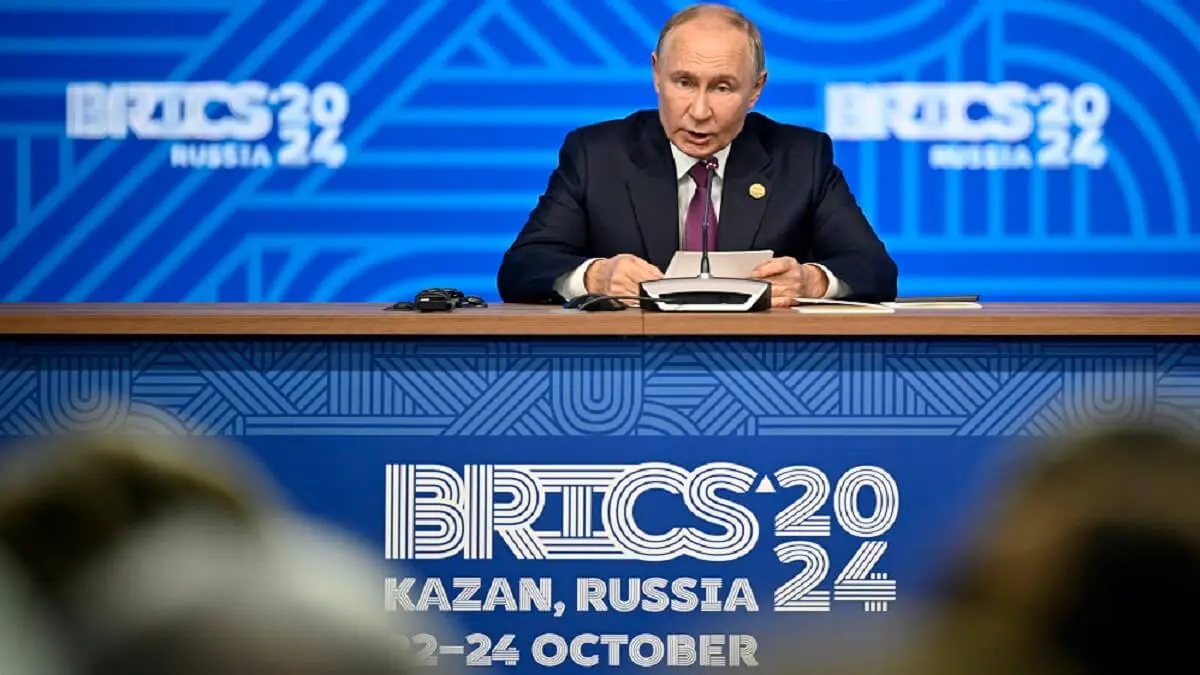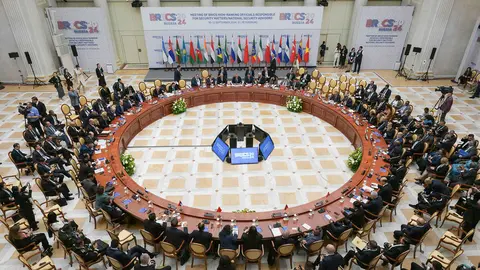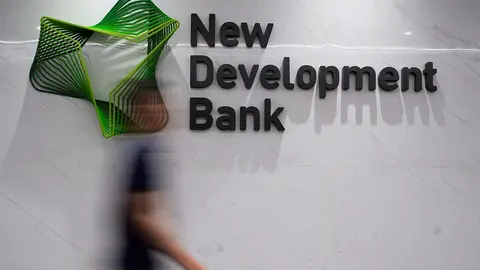Putin manoeuvres through the BRICS to create his parallel world

In reality, it is a challenge to the West and to the multilateral system, created since the end of World War II and which favoured, above all, the hegemony of the dollar and the United States.
The BRICS, moreover, are growing in number: they are a group of emerging market nations that represent around half of the world's population; their acronym comes from the first letter of Brazil, Russia, India, China and South Africa.
These five founding countries account for almost 50% of the world's economy and both China and India have a growth potential that analysts have long seen as the lynchpin of economic leadership in the 21st century.
Egypt, Ethiopia, Iran, Saudi Arabia and the United Arab Emirates have also joined; and at the Kazan Summit, thirteen countries were welcomed as partners: Algeria, Belarus, Bolivia, Cuba, Indonesia, Kazakhstan, Malaysia, Nigeria, Thailand, Turkey, Uganda, Uzbekistan and Vietnam.
We are now witnessing a new international configuration with the re-establishment of diplomatic relations between Iran and Saudi Arabia and new accessions of important countries to the BRICS.
Last year, by mutual agreement, China and Russia decided to include Iran and shelter it from the sanctions it has been suffering from the United States and a certain part of the international community.
Russia faces the same situation in the wake of its ominous invasion of Ukraine. The dictator, Vladimir Putin, host of the Kazan conclave, has had the opportunity to challenge the West and show muscle in front of the White House.
US President Joe Biden declared at the time that he would make Putin a pariah, but the reality is that he has not quite done so, for that he has the shelter of his BRICS allies.
Since part of the Russian financial system was disconnected from the SWIFT system as a result of the invasion of Ukraine by Russian troops on 24 February 2022, Putin has insisted on creating alternative payment mechanisms.
The SWIFT system is a dominant messaging method that underpins global financial transactions. The announced measure is one of the most powerful tools Western authorities have used to punish Russia for what Moscow describes as a ‘special operation’ in Ukraine.
To date, ten major Russian banks have been disconnected from SWIFT, meaning that 60% of Russia's banking market is disconnected from the international financial system.
Of all the BRICS members, it is Russia's economy that has the biggest problems due to sanctions and, although it was initially expected to suffer the greatest economic damage, its sales of oil and gas to China and other countries with which it has intensified trade relations have allowed the fall to be milder.
The reality is that China is helping Russia soften the impact of sanctions and the Western veto, and although China has its own system for parallel financial transactions, 70% of its transactions go through the SWIFT system.
Putin wants more scope for the Cross Border Interbank Payment System (CIPS), a system created by Beijing since 2015 and now gaining special relevance for Russian financial institutions that see it as an alternative to accelerate the expansion of their own cross-border payment and settlement system without having to rely on SWIFT.
Russia has also been exerting some pressure on Xi Jinping's government to make the yuan the currency that takes on the relevant exchange and clearing role.
The Russian leader is trying to ensure that the sanctions for a war that has no end date in sight have the least effect on his economy and is trying to convince China to create a large-scale independent international payment and clearing system in yuan that connects with the clearing markets.
Who supports CIPS? The China National Clearing Centre, a subsidiary of the Central Bank, which is the largest shareholder with a 15.7% stake. The National Association of Financial Market Institutional Investors, the Shanghai Gold Exchange, China Banknote Printing and Minting Corporation and China Union Pay hold a 7.85% stake respectively.
Foreign banks also hold shares in CIPS, including a 3.92% stake owned by HSBC Holdings; 2.36% by Standard Chartered and 1.18% by the Bank of East Asia.
The system was created to boost the international use of China's currency, a mission that began in 2009 with an initial focus on trade settlement. It became more important after Beijing launched the ambitious Belt and Road Initiative (New Silk Road) involving hundreds of billions of yuan in Chinese investments abroad.
At the Kazan Summit, Putin has again pressed the same agenda and is finding more and more echo and support. The BRICS is not just any bloc, although it could be a kind of pariah bloc, and the reality is that it has the United States in its grip.



